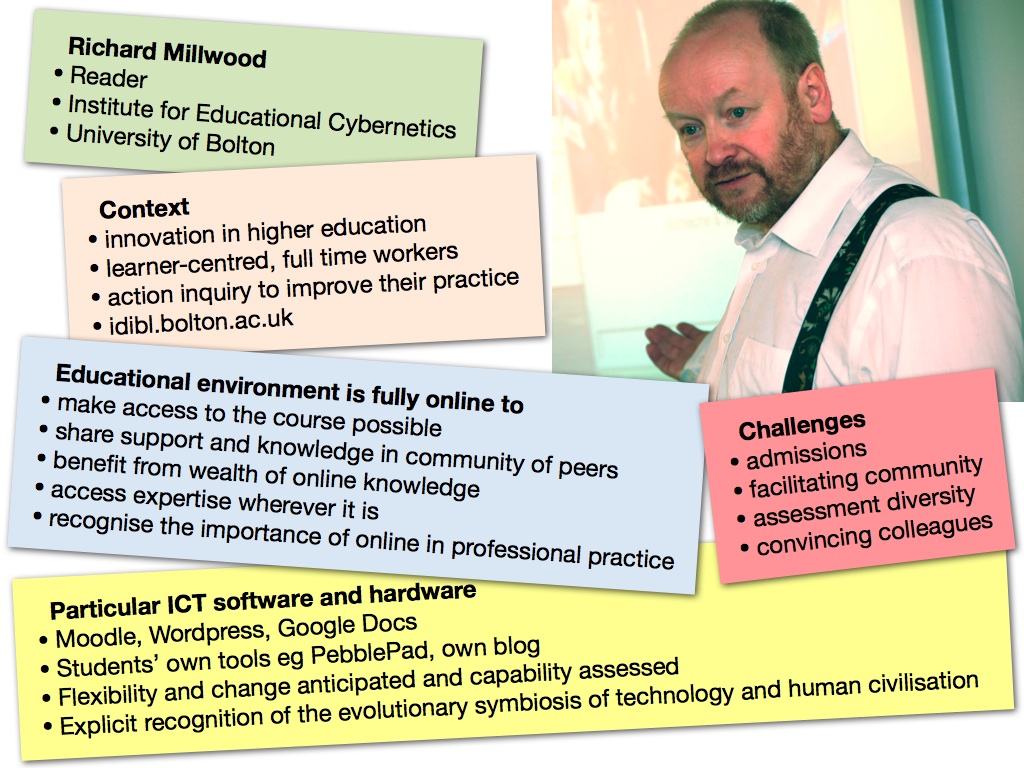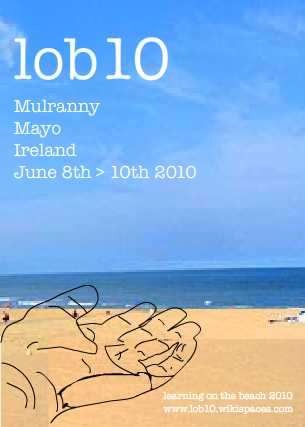All portfolio items
ULearn '08
| When | Oct 07, 2008 |
|---|---|
| Where | Christchurch |
This poster contains the abstracts for each of the five sessions.
(Words: 46 )
Owers Lecture 2008
| When | Nov 12, 2008 |
|---|---|
| Where | London |
The 2008 Owers Lecture, titled 'Can Diplomas Cure the ‘English Disease’?' was presented by Jamie Tuplin and Pete Williamson from Barking and Dagenham talked about their implementation of Diplomas and Engineering in particular, Mick Waters of QCA responded.
(Words: 77 )
UVAC 2008
| When | Nov 13, 2008 |
|---|---|
| Where | York |
These are the slides we presented.
(Words: 39 )
JISC-CETIS '08
| When | Nov 29, 2008 |
|---|---|
| Where | Birmingham |
This is the output from the session 'Re-inventing institutional processes to support flexible learning'.
(Words: 54 )
Think Tank - the Student Learning Experience
| When | Dec 04, 2008 |
|---|---|
| Where | Bolton |
(Words: 31 )
NUCCAT workshop
| When | Jan 30, 2009 |
|---|---|
| Where | Bolton |
(Words: 34 )
SITE 2009
| When | Mar 05, 2009 |
|---|---|
| Where | Charleston |
This is the slide I used for my opening statement:

(Words: 46 )
CAL '09
| When | Mar 25, 2009 |
|---|---|
| Where | Brighton |
This is the poster.
(Words: 33 )
EduSummit '09
| When |
Jun 11, 2009
to
Jun 12, 2009 |
|---|---|
| Where | Den Haag |
(Words: 38 )
KIDMM Knowledge Wiki Workshop
| When | Jul 08, 2009 |
|---|---|
| Where | Uxbridge |
(Words: 30 )
ULearn '09
| When | Oct 06, 2009 |
|---|---|
| Where | Christchurch, New Zealand |
These are the slides I presented.
(Words: 36 )
PhD supervisor for Michelle Singleton
| When |
Oct 16, 2009
to
Jul 31, 2013 |
|---|---|
| Where | Bolton |
(Words: 38 )
Governor Sawyers Hall College
| When |
Dec 01, 2009
to
Aug 31, 2012 |
|---|---|
| Where | Brentwood, Essex |
(Words: 59 )
PhD supervisor for Stephen Powell
| When |
Dec 01, 2009
to
Oct 31, 2013 |
|---|---|
| Where | Bolton |
Abstract
This thesis presents my practice as an action researcher in higher education (HE) over a ten-year period, developing courses for students who were unable to take advantage of the existing provision in the institutions in which I worked. The knowledge I gained and practices that I developed contributed to a series of cycles of action research and the conclusions I draw at the end of the thesis are used to propose a further cycle. The curricula that I developed and delivered were designed for students who had a strong commitment to their work and wanted to improve it, but at the same time wanted to gain academic qualifications; the central premise behind this work being that, ‘work can form the basis for learning, which can then be accredited by higher education’. Although study was based around the work that a student did, their employer had no formal relationship with the university offering the courses. Students were attracted to a package that offered personalised and flexible learning at a cost that was affordable to them. The contributions to knowledge that I make relate to the organisation of teaching, the nature of the innovative curriculum design and the collaborative curriculum change processes carried out. Using this approach, learners make improvements in their work context to gain academic credit from the scholarly practices they have applied to inform and evaluate their activities. The findings suggest that a curriculum design using a teaching and learning strategy based on action-inquiry, delivered entirely online, can be successful in enabling students to work full-time and gain academic credit at a full time rate. However, the results also revealed that there are significant institutional barriers that need to be overcome to implement such a curriculum design that is radically different in having a non-traditional curriculum and unique ways of working. The key recommendation from this body of work is that radical curriculum innovations in HE are more likely to be successful if a separate business unit is established with control over its own capability development. By having control over processes, staffing, and a technical systems infrastructure, a separate business unit is able to respond to the new and different demands placed on it, developing its own culture and identity that fit with a new business model.
Powell (2013)
(Words: 433 )
Owers Lecture 2009
| When | Dec 10, 2009 |
|---|---|
| Where | London |
'Can we reverse the decline in schools' computing, especially with girls?' was the title for the 2009 Owers Lecture. Kate Sim presented her work teaching robotics with Prof Stephen Heppell responding.
(Words: 67 )
Embedding Work-with-IT
| When |
Feb 01, 2010
to
Jan 31, 2011 |
|---|---|
| Where | Bolton |
At the University of Bolton we focussed on the effort to develop the use of our virtual learning environment, Moodle.
http://www.jisc.ac.uk/whatwedo/programmes/staffroles/embedit.aspx
http://www.work-with-it.org.uk/EmbeddingWWIT/BoltonHEA.aspx
(Words: 69 )
PhD Application
| When | Feb 03, 2010 |
|---|---|
| Where | Bolton |
My application form.
(Words: 58 )
iPod 2010
| When | Feb 22, 2010 |
|---|---|
| Where | Oldham |
These are my sildes.
(Words: 46 )
ITTE Research seminar
| When | Mar 15, 2010 |
|---|---|
| Where | Cambridge |
These are my slides.
(Words: 45 )
PhD supervisor for Ian Wilkinson
| When |
Mar 15, 2010
to
Jul 31, 2013 |
|---|---|
| Where | Bolton |
(Words: 43 )
PhD supervisor for Roz Fox
| When |
May 01, 2010
to
Jul 31, 2013 |
|---|---|
| Where | Bolton |
(Words: 39 )
Centre for Recording Achievement seminar
| When | Jun 04, 2010 |
|---|---|
| Where | London |
This was my presentation.
Reflection: I was rewarded to hear Richard Winter say that he had understood, from my presentation, how technology might contribute to the kind of creativity and diversity expected in the Patchwork approach to assessment.
(Words: 96 )
Learning on the Beach 2010
| When | Jun 08, 2010 |
|---|---|
| Where | Mulranny, Mayo |

(Words: 53 )
Putting Patients First
| When | Sep 08, 2010 |
|---|---|
| Where | Bolton |
These are the slides I presented.
(Words: 54 )
Bolton Research & Innovation
| When | Sep 16, 2010 |
|---|---|
| Where | Bolton |
These were my slides.
(Words: 45 )
TEL-Map - Future gazing TEL: the roadmap for the unknown Learning landscape
| When |
Sep 30, 2010
to
Mar 31, 2013 |
|---|---|
| Where | Bolton |
http://www.learningfrontiers.eu/?q=tel_project/TEL-MAP
Project Description
This proposal focuses on topic f) of call 5: exploratory/Roadmapping activities for fundamentally new forms of learning to support take-up of those new forms, via Awareness building and knowledge management on the results of EU RTD projects in TEL and socio-economic evaluations in education and for SMEs . We gather information on the current, desired and emerging position of TEL, and on awareness and appropriation (by educators and SMEs) of RTD results in TEL. We codify that information using state of the art knowledge management tools/ methods, at three levels of scale: 1) macro (political, economic, social, technological, legal, environmental), 2) meso (organisation of education and training systems and institutions), and 3) micro (enacted paradigms of learning and teaching). Cutting across these levels of scale is the categorisation of changes as exogenous or endogenous relative to forms of learning and to the TEL community. This provides direct input to TEL-relevant decisions at all three levels, including economic, political, and research discussions. With a 10-year horizon, we co-develop a portfolio of stakeholder-specific roadmaps and influence maps, to gain insights into fundamentally new forms of Learning, Education and Training activities (LET) and into what makes for effective transfer and scalability. Our collaborative development approach leads to a Multi-perspective Dynamic Roadmap to track, anticipate and manage knowledge about new forms of LET and their impact on TEL. This extends established TEL Roadmapping methods in novel, powerful and cost-effective ways, with high potential for sustainability and for targeting each stakeholder s goals. Outcomes include well-grounded recommendations on TEL and LET innovations, plus a platform and a sustainable dynamic process that will foster collaboration and consensus-building across specialized communities and stakeholder groups.
(Words: 339 )
JISC Eastern Region Joint Forum
| When | Oct 08, 2010 |
|---|---|
| Where | Cambridge |
These are my slides.
(Words: 40 )
JISC-CETIS 2010
| When | Nov 15, 2010 |
|---|---|
| Where | Nottingham |
These are the slides I designed.
(Words: 42 )
Lithuanian ICT seminar
| When | Nov 29, 2010 |
|---|---|
| Where | Vilnius |
The organisers told me "The participants of the seminar were various specialists (directors of departments, university lectors, experts from local authorities, policy makers, authors of teaching and learning recourses) from the Ministry of Education, Vilnius Pedagogical University, the Centre of Special Pedagogy and Psychology, the Centre of Information Technologies in Education, our Education Development Centre, National Agency of School Evaluation, teachers from Lithuanian schools, special education schools and etc, and we call them experts according to the areas of their position and interest: primary education, special education, ICT implementation in education, curriculum, teachers’ training and professional development, quality of education etc."
These are my slides.
(Words: 174 )
PhD supervisor for Tim Goddard
| When |
Dec 14, 2010
to
Jul 31, 2013 |
|---|---|
| Where | Bolton |
(Words: 52 )

